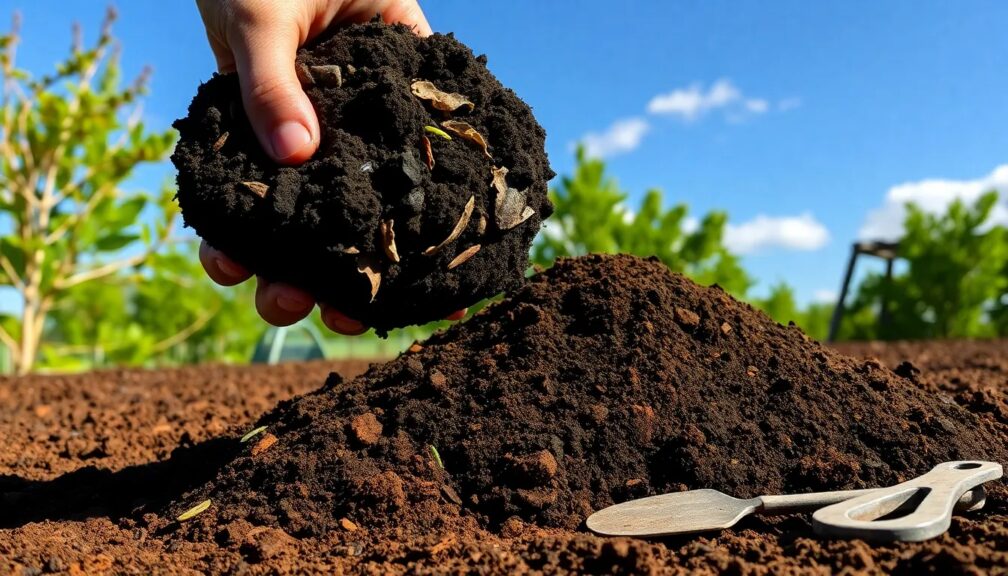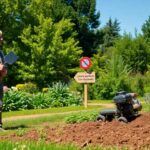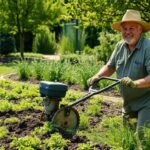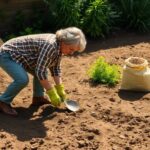Do I need to mix compost with topsoil

Welcome to Our Comprehensive Guide on Whether to Mix Compost with Topsoil
When embarking on gardening or landscaping projects, understanding the benefits and techniques of soil preparation is crucial for successful plant growth. One common question that arises is: "Do I need to mix compost with topsoil?" The integration of compost into topsoil can be a game-changer for your garden, enhancing soil structure, nutrient content, and water retention. In this article, we will delve into the reasons you might want to mix compost with topsoil, how it can benefit your garden, and the best practices for doing so. Whether you're a seasoned gardener or a beginner, understanding the synergy between compost and topsoil will help you create a more flourishing and vibrant garden.
Should I mix topsoil and compost?
Imagine unlocking the secrets to a lush, vibrant garden that's the envy of your neighborhood. It's a quest that gardeners everywhere obsess over. Yet, the answer might lie in a simple but profound question, which, when answered, can elevate your gardening game to dazzling new heights. Mixing topsoil and compost could be the game-changer your green space desperately needs.
Unlock a world of unrivaled plant health and growth, as combining topsoil and compost creates a powerhouse of nutrients, offering your plants the perfect blend of aeration, moisture retention, and fertility. Picture the results – robust plant stems, vivid blooms, and an orchestra of green that dances in your outdoor space.
Discover the magic ratio that seasoned gardeners swear by. Get the scoop on how adding the right proportion of compost to topsoil can supercharge your garden's productivity. From the nutritional needs of your plants to the structural benefits for your soil, the synergy of these two components is poised to transform your garden into a living masterpiece.
What if I told you that you're just a few steps away from achieving garden greatness? Stay with me as we delve into the art and science of blending topsoil and compost – it's a tale of transformation that will leave you on the edge of your seat, green thumbs twitching, ready to bring the magic to your own slice of the great outdoors.
Does compost need to be mixed with dirt?
Imagine stepping into a world where your garden thrives, bursting with lush greenery and vibrant blooms. The secret? Harnessing the transformative power of compost. But wait, before you sprinkle that black gold onto your garden beds, you might wonder if it requires a dance with the regular soil to truly bring about its magic.
The truth is, integrating compost with dirt can elevate its effectiveness dramatically. When these two mingle, they create a synergy that enhances soil structure, nourishment, and microbial activity. The result? A living, breathing soil ecosystem that propels plant growth to new heights.
Consider how compost, rich in organic matter, serves as a smorgasbord for earthworms and beneficial microbes. These tiny workers labor tirelessly, breaking down organic material, aerating the soil, and unlocking essential nutrients. Now, envision this bustling underground community working in tandem with your garden's native soil. The combination is potent, offering unparalleled support for your plants' roots and bolstering their resilience against drought and disease.
But let's not reveal all the secrets just yet. There's a lot more to uncover about the dynamic duo of compost and dirt. Stay tuned to discover how to harness their full potential, and watch as your garden transforms before your eyes. Your plants are yearning for that perfect union, and you have the power to catalyze a growth revolution. Don't let your garden be the one that misses out on this revelation.
How much topsoil to mix with compost?
Unlock the secret to a lush, productive garden that could be the envy of every green thumb on your block. It's all about finding that perfect balance between topsoil and compost — a harmony that can supercharge the growth of your plants and nourish them beyond what generic store-bought bags can offer.
Imagine this: Your neighbors marvel at your vibrant tomatoes, your roses blooming with vigor, and the verdant sprawl of your backyard haven. You can almost hear their whispered questions, "How does their garden look so alive?" It's simple, yet almost magical: it's the ratio.
But let's not get ahead of ourselves. To create this garden of abundance, you must first understand the role of each component:
1. Topsoil: This is the uppermost layer of soil, crucial for providing structure and a base for plants.
2. Compost: A rich, decomposed organic matter that enriches the soil with vital nutrients and microorganisms.
The alchemy of blending these two elements can feel like a garden's best-kept secret. Yet, the knowledge is within your grasp. The ratio can vary depending on the needs of your specific garden, but a general guideline is a tempting starting point. A classic mix might see one part compost to two parts topsoil, but what if your garden craves something different?
The intrigue deepens as you consider the texture of your existing soil, the type of plants you're nurturing, and the environmental factors unique to your locale. There's a reason master gardeners guard this knowledge like a treasure – it's powerful.
By mastering the right mix, you're not just growing plants, you're cultivating an ecosystem. You're not merely gardening; you're conjuring life from the earth itself. And isn't that a journey worth embarking on? Stay tuned and let's explore how you can transform your garden into a living testament to the power of the perfect soil blend.
What happens if you don't mix your compost?
Imagine creating a thriving garden, your plants flourishing with vitality, all thanks to your homemade compost. But there's a catch: neglecting to mix your compost can lead to a host of issues that not only compromise your garden's health but also diminish the quality of your compost.
Without regular mixing:
1. Oxygen Depletion: Compost needs air to support the aerobic bacteria that break down organic matter. Without mixing, oxygen levels drop, and anaerobic bacteria take over, slowing down the decomposition process and potentially killing beneficial microbes.
2. Uneven Decomposition: Layers of your compost pile can become matted and dense. This uneven breakdown results in a patchy, ineffective compost that can unevenly distribute nutrients to your plants.
3. Odor Issues: A lack of aeration often leads to the accumulation of gases such as methane, creating an unpleasant smell. This can attract pests and create a less-than-ideal environment for your garden.
4. Pest Attraction: Without mixing, your compost pile can become a welcoming home for pests such as rodents and insects. These uninvited guests can wreak havoc not only in your compost but also in your garden.
5. Temperature Imbalance: Turning the compost helps to regulate temperature, ensuring the pile heats up sufficiently to break down materials and kill off pathogens and weed seeds. Without this, your compost may become a breeding ground for things you don't want in your garden.
Unlock the full potential of your compost and give your garden the gift of rich, balanced nutrition. The secret lies in the simple act of mixing, a gesture that breathes life into your compost and, by extension, your entire garden. Don't let your compost become a forgotten chore; embrace the transformation it offers, and watch as your garden transforms into an ecosystem bursting with life. It's not just about what happens if you don't mix—it's about the wonders that unfold when you do.
Do i need to mix compost with topsoil reddit
Are you ready to unlock the secrets of a thriving garden? The answer to whether you should mix compost with topsoil could be the game-changer your green oasis has been waiting for. This question has sparked numerous discussions among gardeners and the answer is not as straightforward as one might think.
Firstly, understanding the role of compost is crucial. Compost is decomposed organic matter that enriches soil with essential nutrients and improves its structure. It's like giving your plants a gourmet meal, packed with all the goodness they crave. But hold on, that's not the only magic it performs!
Imagine the structure of your soil transforming, becoming the perfect haven for roots to spread out and absorb water and nutrients efficiently. Yes, compost does that by enhancing soil aeration and water retention. The benefits are clear, but the question remains: should you blend it with topsoil?
On one hand, topsoil serves as the uppermost layer of the soil, where most of the plant's root growth occurs. It typically contains minerals and some organic matter, which can support plant life. However, it might not be enough for optimal growth.
Now, when these two powerhouses meet, the result can be nothing short of spectacular for your garden. Mixing compost with topsoil can create a nutrient-dense environment where plants don't just grow, they thrive. But beware, there's a delicate balance to strike. Too much compost can overwhelm plants, while too little might leave them wanting more.
Before you rush to your garden, consider the type of plants you're nurturing and their specific needs. Some might prefer a different ratio, or even pure compost or topsoil. It's not a one-size-fits-all solution.
The fear of missing out on maximizing your garden's potential is real. Gardeners on Reddit have shared their successes and failures, providing a treasure trove of insights. The balance of compost and topsoil could be the missing piece in your gardening puzzle. Are you ready to take the plunge and discover the mix that will unlock the full potential of your garden? The answer lies in the balance, and finding it could make all the difference. This is gardening gold, and missing out is not an option for those serious about their plants.
Consejo final: Before planting, consider blending compost with topsoil to enhance soil fertility and water retention. This mix can provide a balanced environment for your plants to thrive. Farewell and may your garden flourish!
 When not to use a tiller
When not to use a tiller Can you till a garden with a cultivator
Can you till a garden with a cultivator Will a tiller till up grass
Will a tiller till up grass How do you loosen hard soil without a tiller
How do you loosen hard soil without a tiller How do you loosen soil without hurting roots
How do you loosen soil without hurting rootsIf you want to know more about similar articles like Do I need to mix compost with topsoil you can visit category Gardening Tools.